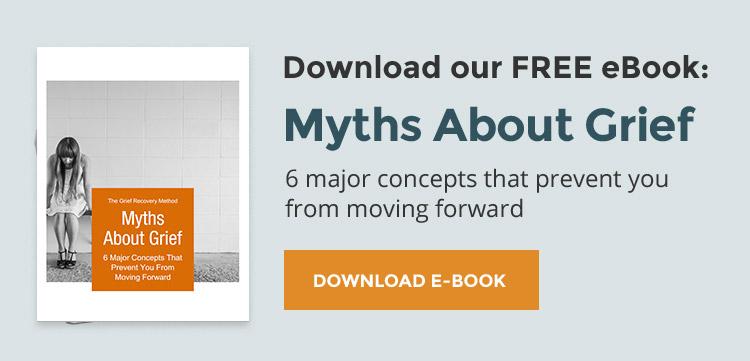Over time, we have identified six major myths about grief that are so universal that nearly everyone can relate to having absorbed them early in life, although they can’t always explain what they mean and whether or not they are true or helpful. You can read part 1, part 2, part 3, and part 4 of this series here as well. When dealing with bereavement it's very important to make sure you don't believe any of these myths.
The six myths are:
- Don’t Feel Bad
- Replace the Loss
- Grieve Alone
- Grief Just Takes Time
- Be Strong and Be Strong for Others
- Keep Busy
Grief Myth 5: Be Strong For Others
Today we’re going to address the fifth myth about grief, Be strong and Be strong for others. In our last blog we talked about the myth that Grief Just Takes Time. We focused on the idea that the key to recovery or completion is the actions we take within time, and not relying on time to do what it cannot do. As we focus on today’s myth, it may become clear to you that the attempt to “be strong” rather than being honest, also keeps us from taking actions that lead to recovery. We’ve rarely met anyone from anywhere in the world who didn’t carry with them the incorrect idea that they need to “be strong” in response to emotionally affecting events.
We realize that there’s a kind of logic in that idea, in so far as when there has been a death, we are often called upon to make notification to other interested family and friends; to take care of details about the memorial or funeral; and to deal with the myriad of practical considerations that accrue when someone dies. The problem lies in confusing the need to have whatever energy and focus are demanded for those tasks, and the false idea of pushing away and covering up the naturally occurring emotions connected to the death of someone important to us. In attempting to “be strong” or “be strong for others,” most people hide their own feelings—at least those that might be visible, as in tears and other natural verbal and non-verbal displays of emotion. In effect, when we act strong that way and cover up our honest emotions, we are lying to those we interact with—not to mention that we may be lying to ourselves.
"I'm fine!"
When we make speeches to large audiences, we often ask this question: “How many of you, when asked how you feel, say ‘I’m fine,’ at times when you are not fine at all?” Inevitably, almost every hand in the audience goes up. We then ask: “How many of you like being lied to? “ Not a single hand goes up. We then say, “So all of you lie about how you feel from time to time, and yet none of you don’t like being lied to—have we got that right?” A silence falls over the room as people realize that the myth of being strong has negatively influenced how they behave with people they know and love. There are a lot of reasons that account for that disconnect between what we do and how we’re affected by what others do. One of them traces back to the first myth we identified in this series of blogs, that is the one that says, “Don’t Feel Bad.” If we’re not supposed to feel bad or sad when something painful happens to us [which makes no sense at all], then it follows that we will have to pretend to feel good and strong even when we don’t, in order to honor the dangerous idea that we aren’t supposed to feel bad in the first place. And if you recall, the third myth we highlighted was “Grieve Alone,” which means don’t show anyone how you really feel, if you’re sad. So there’s another provocation to sink into the myth of Being Strong and hiding how you feel. Now that you have a sense of the problems associated with the myth of being strong, we’re going to give you the solution in a simple phrase:
“You can be strong or you can be human, Pick One!”
Click here to read the next entry in this blog series: Keep Busy (Myth #6).

























Comments
Rebeca
I really appreciated this, lost my father a couple months ago and keep hearing all this over and over. Frustrated with the unrealistic expectation that I'm supposed to be "back to normal life" . Most of my friends my age haven't lost anyone close to them and are oblivious to the pain and emptiness. I have increased my therapy visits and do my best to take it moment by moment. Thank you again for the shift in perspective, makes me feel better about my grieving process.
Cathy Bracco
Thanks,
Cathy
Add new comment